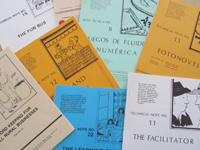The Technical Notes are based on the application of specific nonformal education techniques in field settings. Each Technical Note features a single technique and illustrates its use in a specific context. The notes originated in Nonformal Education projects in a variety of settings, beginning in Ecuador in the 1970s and then in multiple other contexts including Indonesia, Lesotho, Cambodia, and Guatemala.
Technical notes are intended to provide techniques or tools which field workers can adapt and apply in their own setting. Each note is designed to provide all that is necessary for a field worker to adapt the method without additional references.
Article
Participaroty Communication in Nonformal Education, John Comings
Puppets and The Theater, Carlos Moreno, Carla Clason, Amparo Borja, and Gary Dibble
Q-Sort as a Needs Assessment Technique, Sean Tate
Quina de numeros, Jock Gunter, Patricio Barriga, and James Hoxeng
Record Keeping for Small Rural Businesses, Eligia Murcia
Road-to-Birth Game, Julie Burns and Frank Bialosiewicz
Rumy de mercado, Jock Gunter, William A. Smith, and Patricia Burke
Skills Drills: A Self-Correcting Math Proficiency Game, Fredi Munger and Holly Shader
Tabacundo: Battery-Powered Dialogue, James Hoxeng, Alberto Ochoa, and Valerie Ickis
Tabacundo: diálogo radiofónico, James Hoxeng, Alberto Ochoa, and Valerie Ickis
Teatro y títeres, Carla Clason, Carlos Moreno, Amparo Borja, and Yvonne Villanueva
The Ecuador Project, David R. Evans and James Hoxeng
The Education Game, William A. Smith
The Facilitator, Patricio Barriga, Valerie Ickis, Carlos Moreno, and Enrique Tasiguano
The Fun Bus, Robert Russell
The Learning Fund: Income Generation Through NFE, Anwas Iskander, Daniel Moulton, and Umberto Sihombing
Using Consultants for Materials Development, Nancy Bergau and R.F. Soedharno
